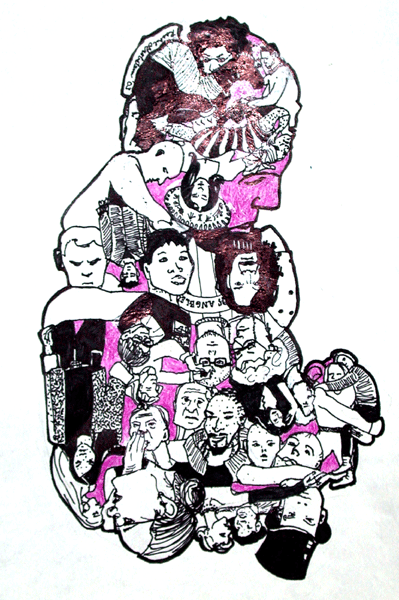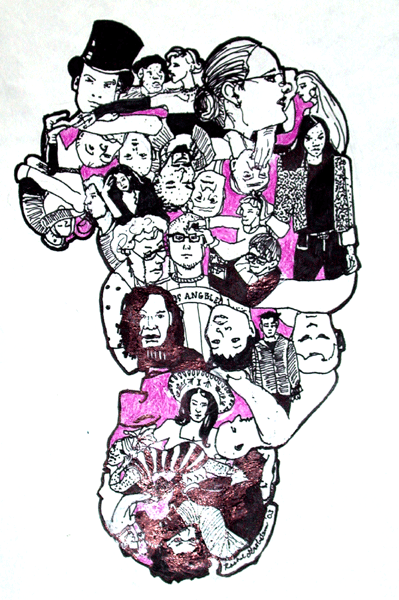Made available on Serendip
In association with Making Sense of Diversity: An Exploration, a world wide conversation

|
September 9, 2005
Li-Chen Chin, Alev Cinar, Ronke Imbeah-Ampiah '06 and Christine Koggel
Women's Roles 'Round the World
Participants
Summary
Prepared by Anne Dalke
Additions, revisions, extensions are encouraged in the On-Line Forum
| 
|
Christine began the conversation by saying that many economists and political theorists are now interested in women's roles around the world; a great deal of quantitative and qualitative data has been assembled that intersects with her own research as a developmental ethicist. She called our attention to a report prepared by the World Economic Forum, Women's Empowerment: Measuring the Global Gender Gap, which uses five parameters (economic participation, economic opportunity, political empowerment, educational attainment, and health and well-being) to illustrate huge discrepancies. Christine cautioned us treat such quantitative data skeptically; increased economic productivity might mean a misallocation of human resources, rather than the acquisition of rights for women. A woman's entering the work force might mean she has little say regarding her working conditions, or find herself disempowered in the context of her home. Christine also evoked the work of the well-known economist Amartya Sen, who distinguishes between programs that treat the oppressed as passive recipients of aid, rather than as active agents making change.
Li-Chen added a personal dimension to these five parameters of women's empowerment. She grew up in a Taiwainese family that emphasized education for women, but was ambivalent about the consequences of such an education for social and economic participation in the world (would getting a Ph.D., for instance, reduce a woman's prospects of getting married?). Asian women in particular have been encouraged to be compliant and complacent, rather than independent. Modern ideas repeatedly conflict with tradition, as such women try to envision themselves fitting into the larger society. What role might an American women's college like Bryn Mawr play in such a dynamic?
Ronke noted that only three African countries (Egypt, South Africa and Zimbabwe) were represented in the report from the World Economic Forum; she shared her experiences of living in Ghana and more recently, last semester, in London. In Ghana, where she is from, women are held in high esteem. Although their primary role is seen as domestic, they also act as entrepreneurs and work to support their
families. Although there has been an increase in number of women taking up positions thought to be traditionally "male," the country has a long way to go to achieve gender equality.
Alev then shared some of her observations about the women's movement in Turkey. When the Turkish state was formed in 1923, a women's federation was founded. Turkish women were granted a number of public rights as citizens before European women were, and without fighting for them; this was part of the attempt to create an image of a modern country. From interviews with Islamist feminists, however, Alev has learned that not all women share the goal of participation in the public sphere. Some women are opposed to assuming public roles, because they will deprive them of what they most enjoy and value: becoming good wives and respectable mothers, earning state subsidies (for instance) for houses with gardens where their children can play.
Local contexts differ; so, too, do individual women regarding what is good for them and what they want. Even among educated women, one can't generalize to a single monolithic ideal of what is "natural."
Discussion centered on the relationship between choice and economic capacity. We learned that in Kenya, women are "dual pillars" of the family: they both care for children in the home, and provide external economic support for their families. There were questions about the leadership roles of women in organizations. We learned that in Rwanda, there are proportionally more women representatives than in any other country. It was also suggested that the "ideological edges" can offer interesting possibilities for women. A woman who is "narrowly ambitious" might well place herself on the right of the political spectrum in this country, for instance, and thereby take advantage of unexpected job opportunities.
Opportunities in peace education were offered as another example. Often viewed as a "soft" women's field, peace and conflict studies can be reframed. Redefined in militaristic terms as education for "human security," it can thereby get funding from the Defense Department for projects having to do with "Securities Studies."
Discussion closed with a query about whether, when women rise to high profile political positions, they need to become men. Can we change the structures, to allow women serving in public capacities to "remain women"? Yet it was also observed that some women who participate in politics prefer not to "wear woman" as an identity. They want to be seen as individuals, and refuse to participate in group rights organizations. Is this to be celebrated as one of the accomplishments of feminism: the freedom not to claim identity as a woman?
The discussion is invited to continue further in the on-line forum on "Making Sense of Diversity," and will resume in person at noon on Friday, September 23, when Alisa Horwitz, Kelli Payne and Annabella Wood will lead a discussion of "College as a Choice: Blue Collar Roots, White Collar Dreams."
| Return to Schedule for Friday Noon Conversations

| Bryn Mawr Conversations
| Archived
Forum
| Archive of Bryn Mawr Conversation
| General Conversation
| Serendip Home |
These pages are sponsored by the Bryn Mawr College Office
of Intercultural Affairs, the Center for Science and Society and the Serendip
website. Send us additional comments or suggestions at Serendip
© by Serendip 1994-
- Last Modified:
Wednesday, 21-June-2005 15:18:00 EST

